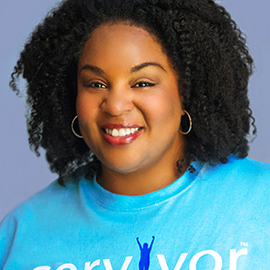How my story begins: It was discovered that I had stage IIA cervical cancer. Hearing my diagnosis was indescribable. You're so numb and you just can't believe that you've heard those words. I couldn't process it, because I couldn't believe it. There is no blueprint to exactly prepare you for this. It's so personal and jarring.
Life before my diagnosis: I was working in Washington, DC as a successful television producer and having the time of my life! Then on April 12, 2001, I went in for a routine Pap after not having had one for a few years. I went for some pretty typical reasons: lack of insurance and body image issues.
How I felt after diagnosis: I felt a deep depression, heartbroken about the loss of a child I never had and the loss of everything I thought that made me a woman.
My treatment: My doctors told me that my best chance at living was to have a radical hysterectomy. There was also a procedure called a radical trachelectomy. But, I would have to get pregnant immediately or freeze my eggs. Harvesting my eggs was very expensive – and my health insurance wouldn’t pay for it because I was unmarried. It was impossible to raise the funds. Finally, everyone agreed just going ahead with the hysterectomy would be best for me. Chemo and radiation followed.
How I felt after treatment: I went from a vivacious 25 year old to feeling like a 95 year old woman. I needed help in the beginning and it was so weird to have my mom and a nurse. But I was so appreciative of it. I had a blood clot so I was sent home with an open wound. The hot flashes and night sweats were awful and I am glad that I'm beyond that phase. But I was so grateful for my second shot at life. I tried relentlessly to get back to normal life, my career, my world – one that didn’t include cancer. But it’s kind of hard once your body fails you and you’re constantly going in for check-ups and everyone around is asking you, “How do you feel?”
What was most difficult for me: For me, losing my fertility was the most difficult part of this experience. Don't get me wrong - I am so happy to be alive. But every time I think I am past not being able to birth a child, something happens to remind me that it's still difficult for me. It was also difficult for me to be so open, in such a public way about my lady parts and a cancer that was linked to sex. I've always been open and never shied about sex and intimacy, but this was different.
Where I am today: I’m cancer-free and enjoying life!! I feel blessed and amazingly wonderful. I've dedicated my life to cancer advocacy and doing my part to make a difference. I'm living out all of my dreams and it feels so d*mn good! Cervical cancer has changed my life forever. But what doesn’t kill you makes you stronger. I am strong. I’m a survivor! Life is meant to be lived and I am living it! I.AM.LIVING.IT.
What I want other women to know: There is life beyond cancer. I see so many women (and men) who are stuck and it saddens me. Cancer is hard, destructive and oh so disrespectful, but you can thrive beyond your circumstance. Sure, it seems so hard when you are in the thick if it, but it's when you are at your lowest that you learn how strong you are. I was a strong-willed person before cancer and cancer really depleted me. But it also showed me how strong I was/am and no one can take that away from me. When life gets hard and I feel like I can't make it, I dig deep and remember the resilience that I used to fight cancer. That's what I want women to know - that we are resilient, that you can bounce back from the cancer card you were dealt.
How I will try to help others: In 2005, I started Tamika & Friends, Inc. a nonprofit dedicated to cervical cancer survivors and their friends/family. At the time there wasn't any support for cancer survivors. The Internet was just getting of the ground and I needed support. The more I told my story, the more it reached women. I help others by what I do best - talking! :-) And that’s how Cervivor was born!
I also want to empower women to speak up and ask lots of questions, even the difficult ones. For example, this cancer can impact your sex life. And as I say often, "You've survived cancer; so you deserve a decent orgasm!" Yeah, you know you do! ;-)
